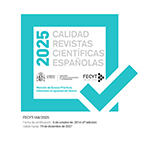Lo postsecular. Un concepto normativo
Resumen
En este artículo examino el concepto “postsecular”, como ha sido empleado en la filosofía y sociología actuales, principalmente por Jürgen Habermas y Klaus Eder. Para ello, analizo el concepto desde una perspectiva descriptiva, a partir de los datos sobre la situación de la religión en las sociedades de Estados Unidos y Europa. Defenderé que el concepto “postsecular”, que se atribuye a las sociedades europeas, no es efectivo como categoría descriptiva, pues no hay en éstas una inversión de la tendencia secular. Por el contrario, sostendré que el concepto es válido como categoría normativa, ya que ofrece claves para interpretar el desafío de integración de las comunidades religiosas en el contexto de los Estados seculares europeos. Concluiré que los niveles del concepto “postsecular” (descriptivo y normativo) deben ser diferenciados, con el fin de distinguir entre hechos sociales y lo que se espera (y por qué) de los ciudadanos ante esos hechos sociales.
Descargas
Descarga artículo
Licencia
La revista Política y Sociedad, para fomentar el intercambio global del conocimiento, facilita el acceso sin restricciones a sus contenidos desde el momento de su publicación en la presente edición electrónica, y por eso es una revista de acceso abierto. Los originales publicados en esta revista son propiedad de la Universidad Complutense de Madrid y es obligatorio citar su procedencia en cualquier reproducción total o parcial. Todos los contenidos se distribuyen bajo una licencia de uso y distribución Creative Commons Reconocimiento 4.0 (CC BY 4.0). Esta circunstancia ha de hacerse constar expresamente de esta forma cuando sea necesario. Puede consultar la versión informativa y el texto legal de la licencia.











